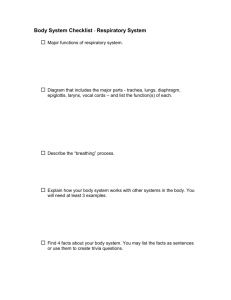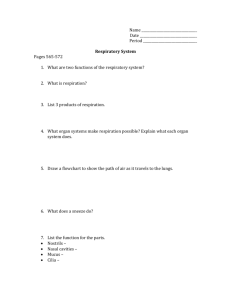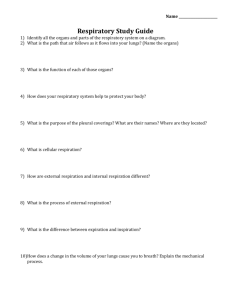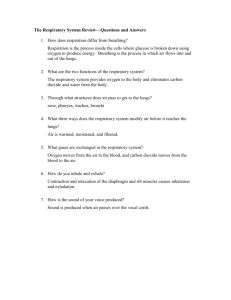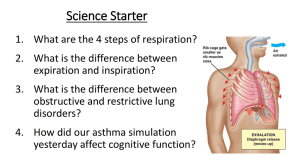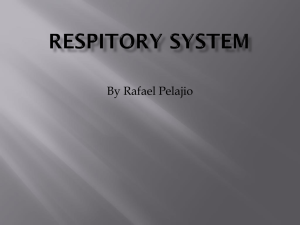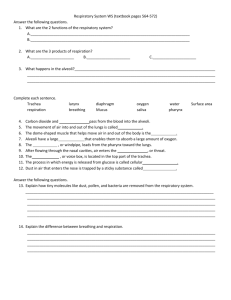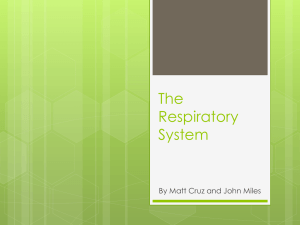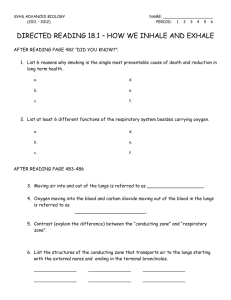Respiratory System
advertisement
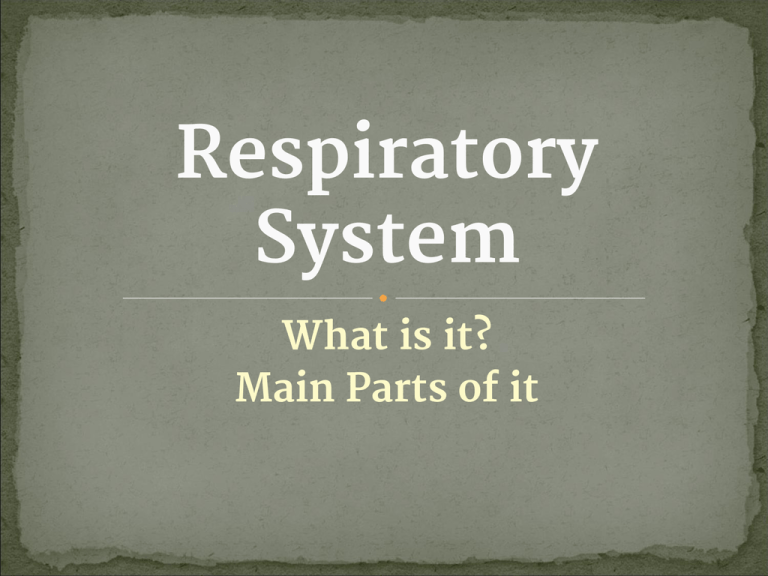
Respiratory System What is it? Main Parts of it In Your PODS ● Come up with 4 things that you know about the Respiratory System (or think you know). ● Come up with 4 questions that you have about the Respiratory System. MAIN PURPOSE OF RESPIRATORY SYSTEM MAIN PURPOSE OF RESPIRATORY SYSTEM Respiration (Breathing) * We need oxygen to survive!! In Your PODS 1. What happens in our bodies when we breathe? What Happens When We Breathe? Respiration (Oxygen/CO2 Exchange) ●Take out a piece of notebook paper to draw on. ●Draw a heart, two lungs, and a stickman. ● Taking Pulmonary Circulation a step further. Respiration (Oxygen/CO2 Exchange) In Your POD’s 2. Why do you think our bodies cough? Why Do We Cough? 2. Our body’s natural way of clearing dust and anything else in our windpipe or lungs. ● We have an automatic “cough reflex” in our body that detects when it’s necessary to cough. ● Our “cilia”, tiny little hairs in our airways, collect dirt. So when they fill up…. COUGH!! How Does Coughing Work? ● When your body senses that there is something in your airway that shouldn't be there, you: ● automatically take a deep breath, ● close your windpipe at the epiglottis momentarily, ● push air against the closed epiglottis with your lung muscles to build up extra pressure, and ● then open your epiglottis. ● When the epiglottis opens, the high-pressure air comes out explosively, and the explosion helps force the matter out of your airways. You can also cough whenever you want to, whether to clear your throat or for other reasons. POD Question 3. Why do we get runny noses? Why do we sneeze? Why Runny Noses? Why Sneezing? 3. It’s another way to protect our airways and to clean out any irritants. We produce more mucous to “flush” out the irritants. ● Allergies irritate our mucous membranes and make us produce an excessive amount. Sneezing: Also a reflex. Similar to the coughing reflex where cilia are filled with dirt or particles in the nose, then ACHOO!!! POD Question 4. Why is the Respiratory System a common site of infection? Why Susceptible To Infections? 4. Because germs can easily enter through your nose and mouth. POD Question 5. What requires more oxygen? Sleeping Or Running A Mile? WHY? More Oxygen? Sleeping or Mile Run? 5. Running a mile, because the demand for oxygen is greater. POD Question 6. What else happens in our bodies when the demand for oxygen is increased? (Hint: Think about other systems we’ve learned about…..) Demand for Oxygen Increased….? 6. Our heart needs to pump more often in order to pump out more blood to the muscles so that they can get proper oxygen to meet the increased demand. * Also, our brain prioritizes where blood should go. POD Question 7. Come up with a list of 4-5 activities where respiration (breathing) is essential (very important) to the activity. Activities of Respiration Activities of Respiration Activities of Respiration Activities of Respiration Take out your Respiratory Diagram The Flow of Air • Air enters through the NOSE and MOUTH • Lined with mucous membranes • Fine hairs called cilia trap dirt From the nose and mouth to the….. • Throat • Has two passageways • One for air • One for food (down to digestive system) • “It went down the wrong tube!”…… Throat to the…. ● Epiglottis ● A flap of tissue that closes over the trachea when you swallow. Epiglottis to the………… ● Larynx ● Contains the vocal cords ● It grows larger during puberty ● Adam’s Apple ●(***Hum to find where your larynx is). Larynx to the….. ● Trachea ● Directs air to the lungs. ● Long tube Trachea to the….. ● Bronchi ● Passages through which air enters the lungs ● You have a left and right “bronchus” because they are like a “V” ● They go directly into the lungs Bronchi to the….. ● Lungs ● Oxygen is transferred into the blood and carbon dioxide is removed from the blood. ● (Alveoli and capillaries) Healthy Lungs Lungs of a Smoker ●On left, Empysema ●On right, Lung Cancer What's in a Cigarette? There are approximately 600 ingredients in cigarettes. When burned, they create more than 4,000 chemicals. At least 50 of these chemicals are known to cause cancer, and many are poisonous. ●Many of these chemicals are also found in consumer products, but these products have warning labels. While the public is warned about the danger of the poisons in these products, there is no such warning for the toxins in tobacco smoke. ●Here are a few of the chemicals in tobacco smoke, and other places they are found: ●Acetone – found in nail polish remover ●Acetic Acid – an ingredient in hair dye ●Ammonia – a common household cleaner ●Arsenic – used in rat poison ●Benzene – found in rubber cement ●Butane – used in lighter fluid ●Cadmium – active component in battery acid ●Carbon Monoxide – released in car exhaust fumes ●Formaldehyde – embalming fluid ●Hexamine – found in barbecue lighter fluid ●Lead – used in batteries ●Napthalene – an ingredient in moth balls ●Methanol – a main component in rocket fuel ●Nicotine – used as insecticide ●Tar – material for paving roads ●Toluene - used to manufacture paint Smoker vs. Non-Smoker Lungs Questions?? ? In Your PODS ● Partner up with one person within your POD ● Act as if they have never heard anything about how blood gets oxygen and how the body gets out bad carbon dioxide. ● Draw for them on a napkin (or on notebook paper) the entire process of Oxygen/CO2 exchange. Label parts. Try not to use your notes!! ● Then, you pretend that they didn’t teach you anything and draw and teach the same thing to them. Respiratory Lab What does smoking ONE cigarette do to your lungs? LET’S FIND OUT!!
